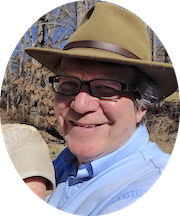DALE TUCKER, a native of California, spent much of his early childhood in Palo Alto and Fresno before his family relocated to north-central Idaho in the late 1960s. It was in Lewiston, Idaho, that his father was elected Pastor of a congregation of nine voting members. Upon trying out for the church pastorate, that cold December Sunday, Tucker’s father won the election—eight votes to one. But within a few years the church had built a new complex and grown to a congregation of over five-hundred members.
Shortly out of high school, Dale Tucker married and began a family while working mostly blue collar jobs but was also active in the non-denominational church in Lewiston where his father pastored.
During these post-high school years, he held a variety of employment positions and explored a number of career paths that included banking, drywall and cabinet finishing, clothing retail, house painting, plumbing, carpet laying, and for several years the management of a music store, which he enjoyed most of all.
But in 1988, he felt a calling to church ministry and, together with his wife and family, moved to Corvallis, Oregon, where he attempted to establish a non-denominational congregation like his father’s. He rented an unheated chapel on the premises of the County Fair grounds for ten dollars per week and began his church-planting efforts while his wife worked at a local hospital as a Registered Nurse.
After nine months, however, the family’s home in Lewiston had not sold so Tucker and his wife decided to return to Lewiston where he would attend the local, liberal arts college and pursue a degree in Education with the goal of becoming a high school English teacher and writer. In 1993, Tucker achieved his degree in English with honors and with minors in Art and History but could not finish his teaching certification without completing a fifth year of study which was not financially possible at that time.
After graduation, Tucker and family remained in Lewiston because the children were older now and the family rooted within the community. He considered continuing his education at the graduate level with the aim of becoming a college professor but, again, financial as well as age considerations—he was thirty-eight by then—were not favorable. So he returned to the sort of work he had done before college, though exploring new avenues within the scope of opportunity available in his small town and the service industry it sustained.
He took various positions such as salesclerk for a pricy clothing store, barista at an outdoor coffee cart, graphic designer for a teeshirt printing company, prep cook for an ice cream shop and grill, dishwasher and line cook for an upscale restaurant, dough mixer for a boutique bakery, and evening language instructor at the local community college, helping immigrants learn and improve their English skills. These were the primary jobs Tucker worked, though there were others, as well.
In 2001, his marriage of twenty-six years ended amicably in divorce. But since entering college and up until that time, while working the various jobs already mentioned, Tucker painted, and developed his skills as a visual artist, as well as exhibited and sold his work regionally in pursuit of a professional, full time, career as a painter which was his ultimate intention. And had he lived in a larger city, this might have been possible.
But in 2003, Tucker landed what he thought was his dream position: he became Curator for the local Art and History Museum, administered by the college from which he graduated. However, Tucker did not anticipate the fundraising pressures that the job entailed when he took it so ended up resigning two and a half years later. But the opportunity to install art and history exhibits and work closely with artists of all kinds and their work turned out to be one of the highlights of his multifaceted career.
2006 marked the re-focus of Tucker’s artistic energies and final turning in his career as he transitioned from fine art painting to writing—his original reason for studying English at college. Literary fiction became his genre. Themes of interest to Tucker, both in painting and writing, have been family oral tradition, poverty, simplicity of living, and spirituality.
Dale Tucker is now retired and spends his time writing, cooking, and Nature-watching from the cottage in the foothills of the Appalachian Mountains of North Carolina where he lives. He shares a simple and happy life now with his soulmate, Kathryn, and their Manx cat, Dill. He plans to continue writing novels for as long as Heaven allows.
To read sample chapters of Wanderer Come Home click HERE!
* * * *
